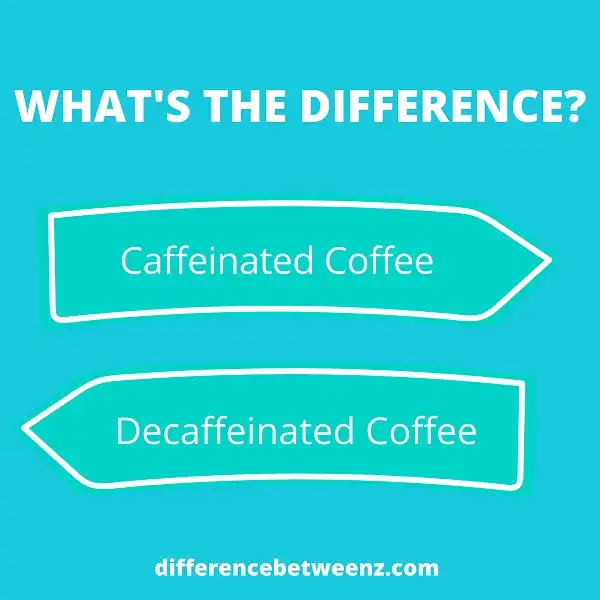If you’re like most people, you probably drink coffee every day. And if you’re like most people, you’ve probably wondered whether there’s any difference between regular coffee and decaffeinated coffee. In this post, we’ll take a look at the differences between caffeinated and decaffeinated coffee, and we’ll also discuss the health benefits of each. By the end of this post, you’ll have a good understanding of which type of coffee is best for you. So let’s get started!
What is Caffeinated Coffee?
Caffeinated coffee is coffee that has been brewed with coffee beans that contain caffeine. Caffeine is a natural stimulant that can have both positive and negative effects on the human body. When consumed in moderation, caffeine can improve alertness and mental productivity. However, too much caffeine can cause jitters, anxiety, and difficulty sleeping. Caffeine is also addictive, meaning that regular consumption can lead to dependence and withdrawal symptoms. Caffeinated coffee is widely consumed around the world and is available in both hot and cold varieties. It can be enjoyed plain or with milk, sugar, or flavorings. Caffeinated coffee is also a popular ingredient in many specialty drinks, such as lattes and frappuccinos.
What is Decaffeinated Coffee?
Decaffeinated coffee is coffee from which the caffeine has been removed. Decaffeination can be done using several methods, including water processing, solvent-based extraction, and carbon dioxide extraction. Decaffeinated coffee typically has 97% of its caffeine removed, though some brands boast that their products are 100% caffeine-free. Decaffeinated coffee is often used by people who want to enjoy the taste and aroma of coffee without the stimulating effects of caffeine. It is important to note that decaffeinated coffee still contains small amounts of caffeine, so it is not completely free of the substance.
Difference between Caffeinated and Decaffeinated Coffee
Caffeinated and decaffeinated coffee differ in their levels of caffeine. Caffeinated coffee has more caffeine than decaffeinated coffee. Decaffeinated coffee has had the majority of its caffeine removed, while caffeinated coffee has not. The process of decaffeinating coffee beans removes much of the coffee’s flavor. This is why decaf tastes different than regular coffee. It can also be less effective in preventing drowsiness. Caffeine is a stimulant that can make you feel more awake and alert. It can also increase your heart rate and blood pressure.
Caffeine is absorbed quickly into the bloodstream and reaches its maximum level within about 30-60 minutes. Decaf coffee still contains small amounts of caffeine, but it’s generally about 97% caffeine-free. Caffeinated coffee contains about 100-250 mg of caffeine per 8 oz cup, while decaf generally contains about 2-12 mg of caffeine per 8 oz cup. So if you’re trying to avoid caffeine, decaf is a better choice. But if you’re looking for a pick-me-up, caffeinated coffee is the way to go.
Conclusion
Whether you’re a regular coffee drinker or someone who only indulges occasionally, it’s important to understand the difference between caffeinated and decaffeinated coffee. We hope this article has helped clear up any confusion and armed you with the knowledge you need to make an informed decision next time you reach for a cup of joe. Thanks for reading!


